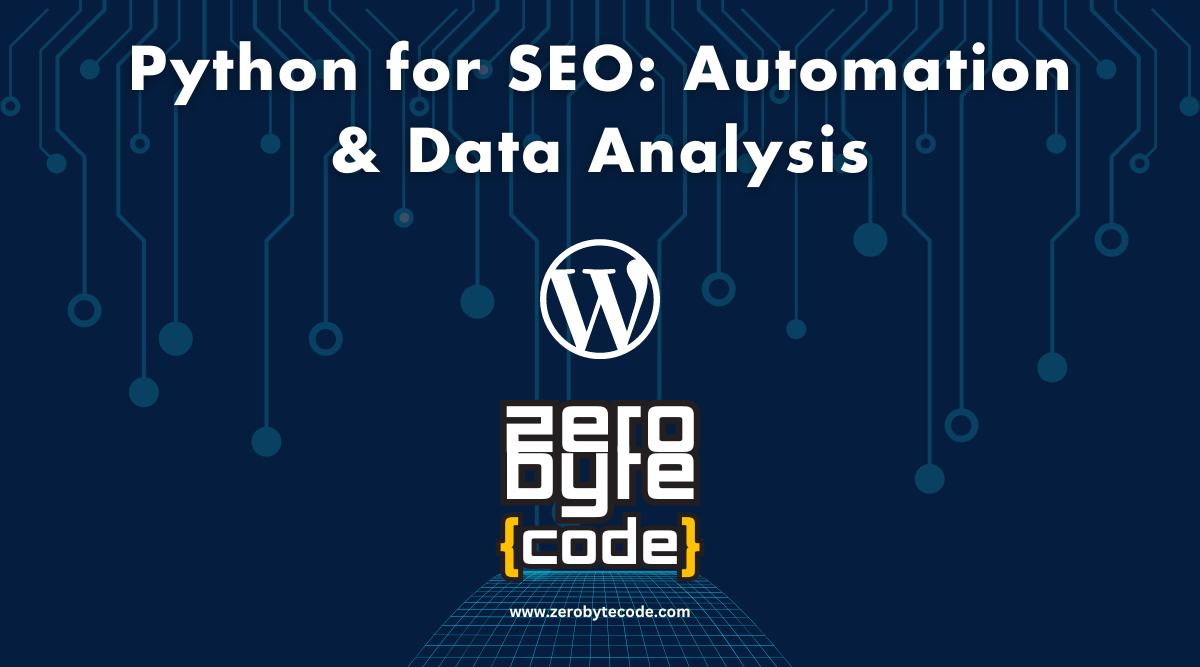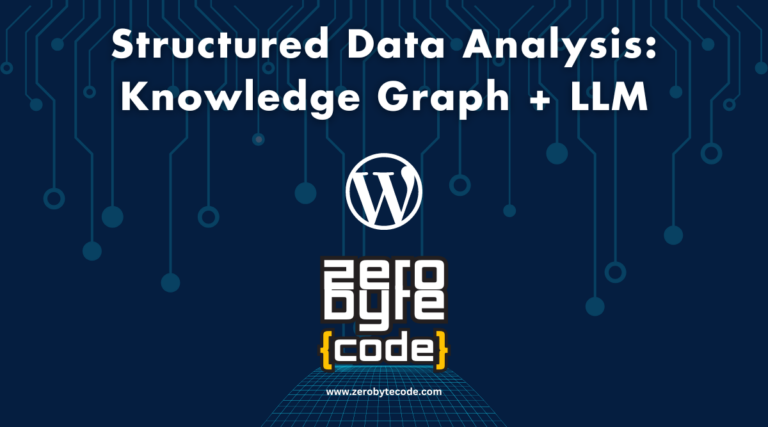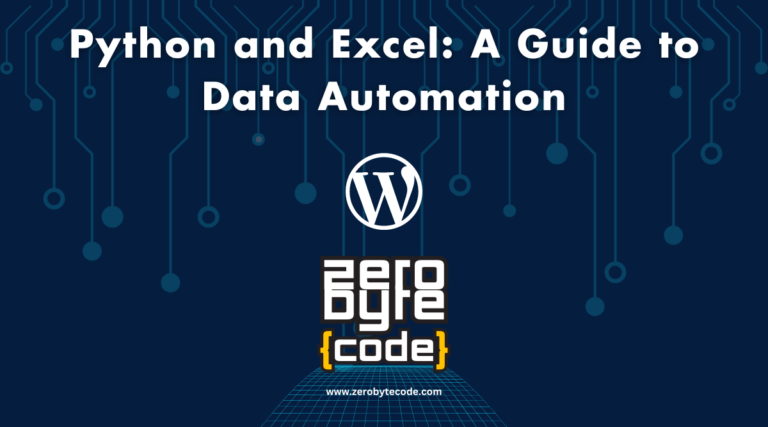Introduction to Python for SEO: Automation and Data Analysis
Introduction to Python for SEO: Automation and Data Analysis – The integration of Python into SEO practices represents a significant advancement for professionals seeking to enhance their strategies through automation and data analysis.
With its robust libraries and capabilities, Python streamlines complex tasks and empowers marketers to extract actionable insights from vast datasets.
This discussion will explore how Python can transform SEO efforts, from setting up an efficient environment to implementing best practices for automation.
TL;DR
Hide- Python streamlines SEO tasks through automation, enhancing efficiency in data collection and analysis.
- Essential libraries like Pandas, Beautiful Soup, and Matplotlib facilitate effective SEO data manipulation and visualization.
- Web scraping techniques allow for gathering data on competitors, keywords, and market trends efficiently.
- Advanced data analysis, including text analysis and sentiment extraction, provides deeper insights into audience and content performance.
As we examine these facets, one may wonder how specific applications of Python can lead to measurable improvements in search engine visibility.
How Python Can Transform Your SEO Strategy
Python offers a range of tools that can greatly enhance SEO automation and data analysis.
By leveraging libraries such as Pandas and Beautiful Soup, SEO professionals can streamline data collection and reporting processes, enabling more informed decision-making.
[toc]
This integration not only saves time but also allows for deeper insights into website performance and optimization opportunities.
Essential Tools for SEO Automation and Data Analysis
Search Engine Optimization (SEO) is crucial for improving website visibility and traffic. Python offers a variety of tools that can automate SEO tasks and facilitate data analysis.
This guide explores some essential Python libraries and tools for SEO automation and data analysis, helping you streamline your workflow and gain insights from your data.
Key Tools and Libraries for SEO Automation and Data Analysis
In this section, we will cover the most important Python tools and libraries used in SEO, detailing their features and applications.
1. BeautifulSoup
BeautifulSoup is a powerful library used for web scraping. It allows you to parse HTML and XML documents, making it easier to extract data from websites.
Features and Applications
- Extracts data from HTML and XML files
- Navigates complex data structures
- Cleans up and filters data
Installation
pip install beautifulsoup4
Basic Usage
from bs4 import BeautifulSoup
import requests
response = requests.get('https://example.com')
soup = BeautifulSoup(response.content, 'html.parser')
# Extract all links
links = [a['href'] for a in soup.find_all('a', href=True)]
print(links)
2. Selenium
Selenium is a browser automation tool that is useful for scraping dynamic content and testing web applications. It can automate tasks in a web browser, such as clicking buttons or filling out forms.
Features and Applications
- Automates browser interactions
- Scrapes dynamic content
- Simulates user actions
Installation
pip install selenium
Basic Usage
from selenium import webdriver
driver = webdriver.Chrome() # or any other browser driver
driver.get('https://example.com')
# Extract page title
title = driver.title
print(title)
# Close the browser
driver.quit()
3. Scrapy
Scrapy is a robust web crawling framework used for extracting data from websites. It’s more complex than BeautifulSoup but offers greater control and efficiency, especially for large-scale scraping projects.
Features and Applications
- Fast and efficient web crawling
- Handles data extraction, processing, and storage
- Supports multiple output formats (JSON, CSV, XML)
Installation
pip install scrapy
Basic Usage
Create a new Scrapy project:
scrapy startproject myproject
Run a Scrapy spider:
scrapy crawl myspider
4. Pandas
Pandas is a versatile data manipulation and analysis library. It provides data structures and functions needed to work with structured data, making it ideal for handling SEO data like keywords, rankings, and traffic metrics.
Features and Applications
- Data cleaning and preprocessing
- Exploratory data analysis
- Data visualization
Installation
pip install pandas
Basic Usage
import pandas as pd
# Load data from a CSV file
data = pd.read_csv('data.csv')
# Display the first few rows
print(data.head())
5. Matplotlib and Seaborn
Matplotlib and Seaborn are popular libraries for data visualization. They can create a wide range of static, animated, and interactive plots, which are useful for visualizing SEO metrics and trends.
Features and Applications
- Create plots and charts
- Visualize data trends
- Customize plot aesthetics
Installation
pip install matplotlib seaborn
Basic Usage
import matplotlib.pyplot as plt
import seaborn as sns
# Simple line plot
plt.plot(data['Date'], data['Traffic'])
plt.title('Website Traffic Over Time')
plt.xlabel('Date')
plt.ylabel('Traffic')
plt.show()
6. Numpy
Numpy is a library for numerical computations. It provides support for large multi-dimensional arrays and matrices, along with a collection of mathematical functions.
Features and Applications
- Perform mathematical operations on arrays
- Efficient handling of large datasets
- Support for linear algebra, Fourier transforms, and more
Installation
pip install numpy
Basic Usage
import numpy as np
# Create a numpy array
arr = np.array([1, 2, 3, 4, 5])
print(arr)
# Perform mathematical operations
arr = arr * 2
print(arr)
7. Google Search Console API
The Google Search Console API allows you to access data from Google Search Console, such as search analytics, sitemaps, and indexing status. It’s an essential tool for analyzing website performance on Google search.
Features and Applications
- Retrieve search performance data
- Monitor indexing status
- Manage sitemaps
Installation
pip install google-api-python-client
Basic Usage
To use the Google Search Console API, you need to set up a project in the Google Developers Console and obtain credentials.
from google.oauth2 import service_account
from googleapiclient.discovery import build
# Setup the Google Search Console API client
credentials = service_account.Credentials.from_service_account_file(
'path/to/credentials.json',
scopes=['https://www.googleapis.com/auth/webmasters.readonly']
)
service = build('webmasters', 'v3', credentials=credentials)
# Retrieve search analytics data
response = service.searchanalytics().query(
siteUrl='https://example.com',
body={'startDate': '2023-01-01', 'endDate': '2023-01-31', 'dimensions': ['query']}
).execute()
print(response)
These tools and libraries form the backbone of SEO automation and data analysis with Python. By leveraging these resources, you can automate repetitive tasks, scrape and analyze data, and gain valuable insights into your website’s performance.
Whether you’re tracking keyword rankings, analyzing traffic trends, or monitoring your site’s SEO health, these tools provide the functionality and flexibility you need to optimize your workflow.
Understanding the Power of Python for SEO
Python has emerged as a powerful tool in the world of Search Engine Optimization (SEO), offering a wide array of libraries and frameworks that streamline and enhance various SEO tasks.
From data extraction and analysis to automation and reporting, Python provides the tools needed to gain a competitive edge in SEO. This guide explores how Python can be leveraged to boost your SEO efforts.
Why Python is Essential for SEO?
Python’s versatility, ease of use, and extensive library support make it an ideal choice for SEO professionals. Here are some key reasons why Python is essential for SEO:
1. Web Scraping and Data Extraction
Python is renowned for its web scraping capabilities, allowing SEO professionals to extract valuable data from websites. This data can include keywords, meta tags, backlinks, and other SEO-relevant information.
Key Libraries
- BeautifulSoup: Ideal for parsing HTML and XML documents.
- Selenium: Great for scraping dynamic content and simulating user interactions.
- Scrapy: A powerful framework for large-scale web scraping projects.
Example: Extracting Meta Tags
from bs4 import BeautifulSoup
import requests
def extract_meta_tags(url):
response = requests.get(url)
soup = BeautifulSoup(response.content, 'html.parser')
meta_tags = {meta['name']: meta['content'] for meta in soup.find_all('meta', attrs={'name': True})}
return meta_tags
meta_data = extract_meta_tags('https://example.com')
print(meta_data)
2. Data Analysis and Visualization
Python’s data analysis libraries enable SEO professionals to analyze and visualize large datasets, such as traffic data, keyword rankings, and click-through rates (CTR).
Key Libraries
- Pandas: For data manipulation and analysis.
- Matplotlib and Seaborn: For creating informative visualizations.
Example: Analyzing Traffic Data
import pandas as pd
import matplotlib.pyplot as plt
# Load traffic data
data = pd.read_csv('traffic_data.csv')
data['Date'] = pd.to_datetime(data['Date'])
# Plot traffic trends
plt.plot(data['Date'], data['Visitors'])
plt.title('Website Traffic Over Time')
plt.xlabel('Date')
plt.ylabel('Visitors')
plt.show()
3. Automation of Repetitive Tasks
Python can automate repetitive SEO tasks, such as reporting, data collection, and site monitoring. This automation saves time and reduces the potential for human error.
Key Libraries
- Requests: For making HTTP requests.
- APScheduler: For scheduling tasks.
Example: Automated Rank Tracking
import requests
def track_keyword_ranking(keyword):
response = requests.get(f'https://api.example.com/track?keyword={keyword}')
ranking = response.json().get('ranking')
print(f'Current ranking for {keyword}: {ranking}')
track_keyword_ranking('Python SEO')
4. Integration with SEO Tools and APIs
Python can integrate with various SEO tools and APIs, such as Google Search Console, Moz, Ahrefs, and SEMrush, enabling seamless data retrieval and analysis.
Key Libraries
- Google API Client: For accessing Google Search Console and other Google services.
- Mozscape: For accessing Moz data.
Example: Fetching Data from Google Search Console
from google.oauth2 import service_account
from googleapiclient.discovery import build
# Setup the Google Search Console API client
credentials = service_account.Credentials.from_service_account_file(
'path/to/credentials.json',
scopes=['https://www.googleapis.com/auth/webmasters.readonly']
)
service = build('webmasters', 'v3', credentials=credentials)
# Retrieve search analytics data
response = service.searchanalytics().query(
siteUrl='https://example.com',
body={'startDate': '2023-01-01', 'endDate': '2023-01-31', 'dimensions': ['query']}
).execute()
print(response)
5. Natural Language Processing (NLP) and Text Analysis
Python’s NLP libraries can be used to analyze and optimize content for SEO. This includes tasks like keyword extraction, sentiment analysis, and content optimization.
Key Libraries
- NLTK: A comprehensive library for NLP tasks.
- spaCy: For advanced NLP and text processing.
Example: Keyword Extraction
import spacy
nlp = spacy.load('en_core_web_sm')
def extract_keywords(text):
doc = nlp(text)
keywords = [token.text for token in doc if token.is_stop != True and token.is_punct != True]
return keywords
text = "Python is a versatile language for SEO automation and data analysis."
keywords = extract_keywords(text)
print(keywords)
6. Competitor Analysis
Python can be used to analyze competitors’ websites, keywords, backlink profiles, and other SEO metrics. This analysis helps identify opportunities and threats in the SEO landscape.
Example: Analyzing Competitor Keywords
from bs4 import BeautifulSoup
import requests
def extract_competitor_keywords(url):
response = requests.get(url)
soup = BeautifulSoup(response.content, 'html.parser')
keywords = soup.find('meta', attrs={'name': 'keywords'})['content']
return keywords.split(',')
competitor_keywords = extract_competitor_keywords('https://competitor.com')
print(competitor_keywords)
Python’s power and flexibility make it an indispensable tool for SEO professionals. Whether it’s automating repetitive tasks, scraping data, analyzing trends, or integrating with other tools, Python can significantly enhance your SEO efforts.
By leveraging Python’s extensive libraries and frameworks, you can streamline your workflow, gain valuable insights, and stay ahead of the competition in the ever-evolving world of SEO.
How Python Can Save You Time and Improve Accuracy
Leveraging automation through programming can greatly reduce the time spent on repetitive SEO tasks while simultaneously enhancing the accuracy of data analysis and reporting.
Python streamlines processes such as data scraping, keyword tracking, and performance analysis. The following table outlines key areas where Python’s automation capabilities can profoundly impact your SEO strategy:
| Task | Benefit |
|---|---|
| Data Scraping | Saves time |
| Keyword Analysis | Increases accuracy |
| Reporting | Enhances clarity |
| Performance Tracking | Facilitates quick decisions |
| Competitor Analysis | Provides detailed insights |
Setting Up Your Python Environment for SEO
Setting up a Python environment for SEO requires careful installation of both Python and essential libraries tailored for data analysis and web scraping.
This foundational step guarantees that users can effectively leverage Python’s capabilities to enhance their SEO efforts.
A well-structured environment will facilitate smoother execution of scripts and integration with SEO tools.
Installing Python and Required Libraries
Setting up a Python environment is essential for implementing SEO strategies effectively.
This process involves a systematic approach to installing Python alongside essential package managers such as pip and Conda, which facilitate the management of libraries and dependencies.
Understanding these tools will empower SEO professionals to harness the full potential of Python in their workflows.
A Step-by-Step Guide to Installing Python
To effectively harness Python for SEO tasks, it is essential to properly install the programming language along with the necessary libraries that will support various analytical functions.
Begin by downloading Python from the official website, ensuring you select the latest stable version. Follow installation prompts carefully, and prioritize security settings.
Introduction to pip and Conda: Essential Package Managers
Pip and Conda are two essential package managers that facilitate the installation and management of libraries in Python, greatly enhancing its functionality for SEO tasks.
Pip is straightforward and widely used, while Conda offers robust environment management capabilities.
Choosing the appropriate manager guarantees a safe and efficient setup, allowing SEO professionals to leverage powerful libraries for data analysis and automation effectively.
Using Python for SEO Data Analysis
In the domain of SEO, Python serves as a powerful tool for data analysis, enabling efficient data extraction and handling.
By leveraging Python’s capabilities, practitioners can visualize complex data sets and uncover insights that drive strategic decisions.
Additionally, advanced analytical techniques can be employed to enhance the depth of analysis, ultimately improving SEO performance.
Data Extraction and Handling with Python
Effective data extraction and handling are critical components in SEO analysis, particularly when working with HTML and JSON data formats.
Understanding how to parse this data efficiently can greatly enhance the insights derived from large datasets.
Additionally, implementing best practices for data management guarantees scalability and reliability in SEO performance evaluations.
How to Extract and Parse HTML and JSON Data
Extracting and parsing HTML and JSON data is essential for SEO data analysis, enabling professionals to gather valuable insights from web content and structured data formats. Utilizing libraries such as Beautiful Soup for HTML and json for JSON allows for efficient data manipulation.
| Format | Library | Purpose |
|---|---|---|
| HTML | Beautiful Soup | Parse and navigate HTML |
| JSON | json | Load and manipulate JSON |
| Data Output | Pandas | Organize data for analysis |
Best Practices for Working with Large Datasets
When handling large datasets in SEO data analysis, it is essential to implement strategies that optimize processing efficiency and secure accurate results.
Consider the following best practices:
- Utilize efficient data structures (e.g., Pandas, NumPy)
- Batch process data to reduce memory load
- Clean data thoroughly before analysis
- Leverage parallel processing for speed
Adopting these practices enhances reliability and performance in your analysis.
Data Visualization with Python
Data visualization is a critical component of SEO data analysis, enabling professionals to interpret complex datasets effectively.
Popular libraries such as Matplotlib, Seaborn, and Plotly provide powerful tools for creating insightful visual representations of SEO metrics.
Introduction to Popular Data Visualization Libraries
An array of popular data visualization libraries in Python provides SEO professionals with powerful tools to analyze and present complex datasets effectively.
Key libraries include:
- Matplotlib: Fundamental plotting library.
- Seaborn: Enhanced statistical visualizations.
- Plotly: Interactive graphing capabilities.
- Bokeh: Real-time data streaming.
Utilizing these libraries can markedly improve the clarity and impact of SEO data analysis.
Visualizing SEO Data for Better Insights
Leveraging Python’s data visualization capabilities enables SEO professionals to uncover actionable insights from complex datasets, driving informed decision-making and strategic optimization efforts.
Tools such as Matplotlib and Seaborn facilitate the creation of clear, informative graphs and charts, allowing practitioners to identify trends and anomalies.
Advanced Data Analysis Techniques with Python
Advanced data analysis techniques in Python offer powerful methods for enhancing SEO strategies through sentiment analysis and entity extraction, as well as text analysis and topic modeling.
These techniques provide insights into customer perceptions and content relevance, enabling more informed decision-making.
Sentiment Analysis and Entity Extraction
Conducting sentiment analysis and entity extraction provides valuable insights into audience perceptions and key topics, essential for optimizing SEO strategies effectively.
By leveraging Python, SEO professionals can:
- Assess brand sentiment over time
- Identify trending topics
- Extract relevant entities from content
- Monitor competitor mentions
These techniques foster data-driven decisions, ultimately enhancing marketing effectiveness and audience engagement.
Text Analysis and Topic Modeling
Text analysis and topic modeling serve as powerful tools for extracting meaningful patterns from large sets of SEO data, enabling professionals to uncover insights that drive content strategy and optimization efforts.
Through techniques such as Natural Language Processing (NLP) and clustering algorithms, practitioners can identify emerging trends and user interests.
Ultimately, these insights inform keyword selection and content creation strategies that align with audience needs and search intent.
Automating SEO Tasks with Python
Automating SEO tasks with Python greatly enhances efficiency and accuracy in digital marketing efforts.
Key areas include web scraping to gather essential data, automating routine SEO reports and analyses, and employing advanced techniques for complex tasks.
Web Scraping with Python
Web scraping is a powerful technique that enables SEO professionals to gather and analyze data from various websites, thereby enhancing their strategic decision-making.
Understanding the applications of web scraping can greatly streamline SEO tasks, from competitor analysis to content optimization.
Additionally, adhering to best practices in web scraping and crawling guarantees compliance with legal and ethical standards while maximizing efficiency.
Introduction to Web Scraping and its Applications
Harnessing the power of web scraping allows SEO professionals to efficiently gather and analyze vast amounts of data from various online sources, streamlining their optimization processes.
Key applications include:
- Competitive analysis
- Keyword research
- Content gap identification
- Backlink monitoring
These capabilities empower SEO specialists to make data-driven decisions and enhance their strategies while minimizing risks associated with manual data collection.
Best Practices for Web Scraping and Crawling
Effective web scraping and crawling techniques are essential for SEO professionals looking to optimize their data collection processes while adhering to best practices that guarantee compliance and efficiency.
Key strategies include respecting robots.txt files, implementing rate limits to avoid server overload, and ensuring data privacy.
Additionally, utilizing libraries like Beautiful Soup and Scrapy can streamline the scraping process, enhancing both safety and effectiveness.
Automation of SEO Reports and Analysis
The automation of SEO reports and analysis using Python streamlines the process of data collection and interpretation, enhancing efficiency and accuracy.
By generating custom SEO reports, professionals can tailor insights to specific objectives and metrics, facilitating more informed decision-making.
In addition, automating repetitive SEO tasks allows for a focus on strategic initiatives, ultimately improving overall performance.
Generating Custom SEO Reports with Python
Generating custom SEO reports with Python streamlines data analysis and enhances decision-making by automating the collection and presentation of key performance metrics.
Benefits include:
- Automated data gathering from multiple sources
- Customizable report templates
- Enhanced visualizations for better insights
- Time-efficient report generation
This approach not only saves time but also mitigates the risk of human error in data reporting.
Automating SEO Task with Python
Automating SEO tasks with Python greatly enhances efficiency and accuracy in managing various aspects of search engine optimization.
By utilizing Python libraries, SEO professionals can streamline repetitive tasks such as keyword tracking, backlink analysis, and performance reporting.
This not only saves time but also minimizes human error, providing more reliable data for informed decision-making.
Ultimately, this contributes to a safer and more effective SEO strategy.
Advanced Automation Techniques with Python
Advanced automation techniques in Python can greatly enhance SEO workflows by integrating with various tools and APIs.
This integration allows for the seamless exchange of data, enabling the development of custom SEO tools tailored to specific needs.
Integrating Python with Other Tools and APIs
Integrating Python with various tools and APIs can markedly streamline SEO processes, enhancing efficiency and accuracy in data analysis and reporting.
Key benefits include:
- Automated data retrieval from SEO platforms
- Seamless integration with Google Analytics
- Enhanced keyword analysis using external databases
- Custom reporting through data visualization libraries
These integrations enable a more strategic approach to SEO management.
Building Custom SEO Tools with Python
Building custom SEO tools with Python enables professionals to tailor automation solutions that address specific challenges in search engine optimization, thereby enhancing overall efficiency and effectiveness.
By leveraging libraries such as Beautiful Soup and Pandas, practitioners can streamline data scraping, analysis, and reporting.
This approach not only saves time but also minimizes human error, ensuring accurate, reliable insights for informed decision-making.
Best Practices for Using Python for SEO
Incorporating best practices in Python for SEO is essential for maximizing efficiency and effectiveness in data management.
This includes strategies for working with large datasets, ensuring that data integrity is maintained while minimizing errors.
Additionally, optimizing Python code is vital for enhancing the performance of SEO automation tasks, ultimately leading to better results.
Working with Large Datasets and Handling Errors
When working with large datasets in SEO, efficient data management techniques are crucial to optimize performance and guarantee actionable insights.
Additionally, implementing robust error handling strategies can greatly enhance the reliability of automation processes.
This section will explore effective tips for managing extensive data and best practices for mitigating errors in Python.
Tips for Working with Large Datasets
Handling large datasets in Python for SEO requires a strategic approach to guarantee efficiency and accuracy throughout the analysis process.
Consider these best practices:
- Utilize libraries like Pandas for streamlined data manipulation.
- Implement chunking to process data in manageable pieces.
- Leverage efficient data types to save memory.
- Optimize queries to reduce processing time.
These strategies enhance performance and reliability.
Error Handling Techniques for SEO Automation
Effective error handling techniques are essential for maintaining the integrity and efficiency of SEO automation processes, particularly when working with large datasets in Python.
Implementing structured exception handling with try-except blocks can help manage unexpected issues.
Additionally, validating data inputs and logging errors guarantees transparency, facilitating timely troubleshooting.
These practices foster a safer environment, minimizing risks and enhancing overall data integrity during SEO operations.
Optimizing Python Code for SEO Automation
Optimizing Python code for SEO automation is essential for enhancing execution speed and efficiency.
Implementing various optimization techniques can greatly reduce processing time, while systematic troubleshooting can address common coding issues that arise during automation.
Understanding these practices will empower SEO professionals to maximize the effectiveness of their Python scripts.
Optimization Techniques for Faster Execution
Implementing efficient coding practices is essential for enhancing the performance of Python scripts used in SEO automation, as it directly impacts execution speed and resource utilization.
To achieve ideal performance, consider the following techniques:
- Utilize built-in functions and libraries
- Minimize global variable usage
- Employ list comprehensions
- Optimize data structures
These strategies help streamline processes and improve overall efficiency.
Troubleshooting Python Code for SEO Automation Issues
Identifying and resolving common issues in Python code is essential for ensuring the smooth execution of SEO automation tasks.
Start by employing effective debugging techniques, such as using logging and breakpoints to monitor code behavior.
Additionally, adhere to best practices like modular coding and thorough testing.
Regularly review dependencies and libraries to maintain compatibility, thereby enhancing the reliability and safety of your automation processes.
Conclusion
To sum up, Python serves as an invaluable asset for SEO professionals by enhancing efficiency and accuracy in data analysis and task automation.
The integration of libraries such as Pandas, Beautiful Soup, and Matplotlib facilitates thorough data collection and visualization, leading to informed decision-making.
Adopting Python not only streamlines workflows but also fosters deeper insights into website performance, ultimately contributing to the effectiveness of SEO strategies.
Embracing this programming language represents a significant advancement in digital marketing practices.







